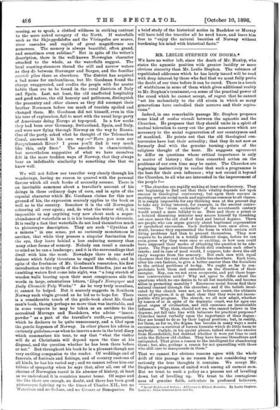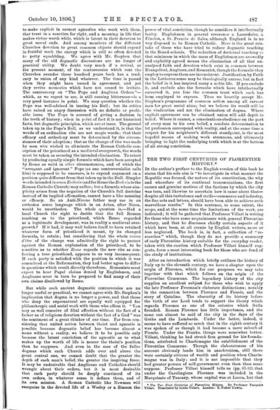MR. LESLIE STEPHEN ON DOGMA.*
Ws have no writer left, since the death of Mr. Huxley, who states the agnostic position with greater lucidity or more obvious sincerity than Mr. Leslie Stephen. The volumes of republished addresses which he has lately issued will be read with deep interest by those who feel that we must fully probe the doubt of our time before it can be cured. There is a touch of wistfulness in some of them which gives additional reality to Mr. Stephen's treatment,—a sense of the practical power of the creed which he cannot accept, of regret that he cannot "set his melancholy to the old strain in which so many generations have embodied their sorrows and their aspira- tions."
Indeed, in one remarkable passage Mr. Stephen proposes some kind of modus vivendi between the agnostic and the Churches. He proposes that they should unite in a spirit of mutual toleration to carry out the great measures which are necessary to the social regeneration of our countrymen and of mankind. He points out that the old theological con- troversies have lost their actuality; that they do not now as formerly deal with the genuine turning - points of the religious thought of the hour. He suggests agreement to differ on questions whose critical importance is only a matter of history ; that thus concerted action on the problems of our own time may be easier. The Churches are beginning instinctively to realise that such a programme is the best for their own influence ; why not extend it beyond the Churches, to all who are interested in the improvement of the people ?-
" The churches are rapidly making at least one discovery. They are beginning to find out that their vitality depends not upon success in theological controversy, but upon their success in meeting certain social needs and aspirations common to all classes. It is simply impossible for any thinking man at the present day to take any living interest, for example, in the ancient contro- versies. The drum ecclesiastic' of the seventeenth century would sound a mere lullaby to us. Here and there a priest or a belated dissenting minister may amuse himself by threshing out once more the old chaff of dead and buried dogmas. There are people who can argue gravely about baptismal regeneration or apostolical succession. Such doctrines were once alive, no doubt, because they represented the form in which certain still living problems had then to present themselves. They now require to be stated in a totally different shape, before we can even guess why they were once so exciting, or how men could have supposed their modes of attacking the question to be ade- quate. The Pope and General Booth still condemn each other's tenets ; and in case of need would, I suppose, take down the old rusty weapons from the armoury. But each sees with equal clearness that the real stress of battle lies elsewhere. Each tries, after his own fashion, to give a better answer than the Socialists to the critical problems of to-day. We ought so far to con- gratulate both them and ourselves on the direction of their energies. Nay, can we not even oo-operate, and put these hope- less controversies aside ? Why not agree to differ about the questions which no one denies to be all but insoluble, and become allies in promoting morality ? Enormous social forces find their natural channel through the churches ; and if the beliefs incul- cated by the church were not, as believers assert, the ultimate cause of progress, it is at least clear that they were not incom- patible with progress. The church, we all now admit, whether by reason of or in spite of its dogmatic creed, was for ages one great organ of civilisation, and still exercises an incalculable influence. Why, then, should not we, who cannot believe in the dogmas, yet fall into line with believers for practical purposes? Churches insist verbally upon the importance of their dogma: they are bound to do so by their logical position; but, in reality, for them, as for us, the dogma has become in many ways a mere excrescence—a survival of barren formulas which do little harm to anybody. Carlyle, in his quaint phrase, talked about the exodus from Houndsditch, but doubted whether it were yet time to cast aside the Hebrew old clothes. They have become threadbare and antiquated. That gives a reason to the intelligent for abandoning them ; but, also, perhaps a reason for not quarrelling with those who still care to masquerade in them."
That we cannot for obvious reasons agree with the whole drift of this passage is no reason for not considering very seriously the true thoughts it contains. We accept Mr. Stephen's programme of united work among all earnest men. But we trust to such a policy as a process not of levelling down but of levelling up. We trust to the contagious- ness of genuine faith, articulate in professed believers,
• Social Rights and Duties : Addresses to Ethical Societies. By Leslie Stephen. London : Swan Sonnenachein and Co. to make explicit in earnest agnostics who work with them, that trust in a sanction for right, and a meaning in life that makes virtue worth while, which is latent in their devotion to great moral ends. And among members of the different Churches devotion to great common objects should expend in fruitful work the energy which is still so often devoted to petty squabbling. We agree with Mr. Stephen that many of the old dogmatic discussions are no longer of practical utility. We doubt very much if a revival, at the present moment, of the controversies which rent the Churches asunder three hundred years back has a tend- ency to union of any kind whatever. The time is passed when they might have issued in agreement, and yet they revive memories which have not ceased to irritate. The controversy on " The Pope and Anglican Orders"— which, as we regret to see, is still causing bitterness—is a very good instance in point. We may question whether the Pope was well-advised in issuing his Bull ; but its critics have raised an angry discussion with no definite or profit- able issue. The Pope is accused of giving a decision in the teeth of history; when in point of fact it is not historical facts, but dogmatic principles, which are at issue. The ground taken up in the Pope's Bull, as we understand it, is that the words of an ordination rite are not magic words ; that their efficacy and orthodoxy must be determined by the circum- stances of their adoption; that as the change of rite was made by men who wished to eliminate the Roman Catholic con- ception of the priesthood as a medimval overgrowth, the words must be taken as securing the intended elimination. To retort by producing equally simple formulm which have been accepted by Rome as valid in other circumstances, and of which the "arrogant and ignorant" Pope (as one controversialist calls him) is supposed to be unaware, is to expend argument on a position quite different from that taken up in the Bull. Simpler words intended in sensu Ecelesim (and for Rome the Eccles ia is the Roman Catholic Church) may suffice ; but a formula whose sim- plicity arises from the negation of the Church's full doctrine instead of its implied affirmation, cannot have a like meaning or efficacy. So an Anti-Nicene father may use in an orthodox sense language which in an Arian, after Nicea, would be unorthodox. The whole question is,—Had a local Church the right to decide that the full Roman teaching as to the priesthood, which Rome regarded as a legitimate development, was in reality a medimval over- growth ? If it had, it may well believe itself to have retained whatever form of priesthood it meant, by its changed formula, to retain ; but considering that the whole raison d'gtre of the change was admittedly the right to protest against the Roman explanation of the priesthood, to be sensitive as to whether Rome regards the new rite as con- ferring a true priesthood, appears to us very inconsequent. If each party is satisfied with the position to which it was committed at the Reformation, they had better agree to differ in questions which result directly therefrom. .Romanists must expect to hear Papal claims denied by Englishmen, and Anglicans must in turn be prepared to find many of their own claims disallowed by Rome.
But while such ancient dogmatic controversies are no longer useful or practical, we cannot agree with Mr. Stephen's implication that dogma is no longer a power, and that those who deny the supernatural are equally well equipped for philanthropic and social work with those who affirm it. "Yon may as well conceive of filial affection without the fact of a father as of religious devotion without the fact of a God " was the sentiment of a great thinker of our time. Far from con- sidering that united action between theist and agnostic is possible because dogmatic belief has become almost a name without a reality, we believe it to be possible only because the latent conviction of the agnostic as to what makes up the worth of life is nearer the theist's position than he supposes. And even in the case of the fuller dogmas which each Church adds over and above the great central one, we cannot doubt that the greater the depth of each man's belief, the greater the inspiring force. It may be undesirable that Anglicans and Catholics should wrangle about their orders, but it is moat desirable that each party should be deeply convinced of its own orders, in whatever sense it defines them, and of
its own mission. A Roman Catholic like Newman will The recognise in the devoted life of a Wesley or a Simeon the Valari. Translated by Linda Villari. Loudon: T. hiker 'Buda. power of vital conviction, though he considers it intellectually faulty. Englishmen in general reverence a Lacordaire, a Fenelon, a St. Francis de Sales, although England is in no way disposed to be Roman Catholic. Here is the great mis- take of those who have tried to reduce dogmatic teaching in the Board-schools. The reduction of doctrinal teaching to that minimum in which the mass of Englishmen are avowedly and explicitly agreed means the elimination of all that un- analysed faith and devotion which exist in common between Evangelical, Anglican, and Romanist, though the formulae they employ to express them are inconsistent. Justification by Faith in the Lutheran sense may be theologically untrue, but in fact the belief in it has inspired many a noble life. If you exclude it, and exclude also the formulm which have intellectually corrected it, you lose the common trust which each has been employed to express. Thus we heartily accept Mr. Stephen's programme of common action among all earnest men for great social aims; but we believe its result will be the vindication and not the elimination of dogma. Where explicit agreement can be obtained union will add depth to belief. Where it cannot, a conscientious obedience on the part of every man to his own belief, a resolute determination to let profession correspond with reality, and at the same time a respect for his neighbour's different standpoint, is the most hopeful means of making work strenuous, and ultimately bringing to light the underlying truth which is at the bottom of all strong conviction.



















































 Previous page
Previous page